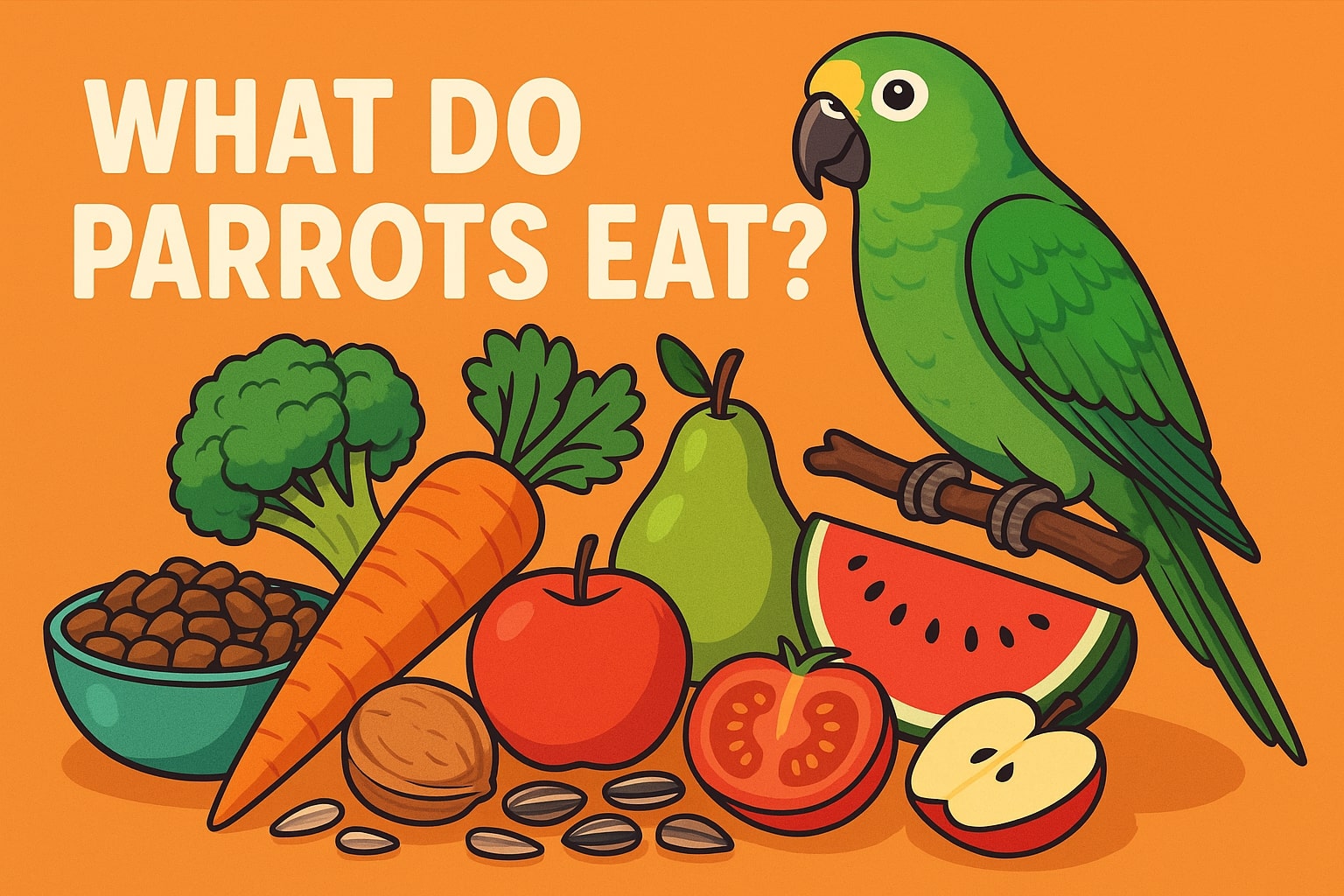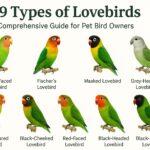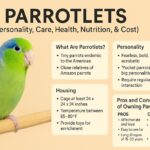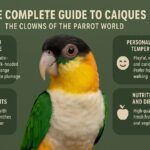Knowing what parrots eat is one of the most important aspects of responsible bird ownership. Unlike dogs or cats that can thrive on commercially prepared foods alone, parrots require a carefully balanced diet that mirrors their complex nutritional needs in the wild.
The foundation of modern parrot nutrition centers around high-quality pellets supplemented with fresh foods, a significant departure from the seed-heavy diets of the past. Research shows that an adult parrot’s diet should consist of 70 to 90% pellet food and 10 to 30% fresh foods, including fruits, vegetables, seeds, treats, and nuts.
This balanced approach ensures your parrot receives all the essential vitamins, minerals, and nutrients needed for optimal health, vibrant plumage, and a long, happy life.
Understanding Parrot Nutrition Basics
Parrots are incredibly intelligent omnivores with complex dietary requirements that vary significantly based on their species, age, and individual health needs. In their natural habitats, these remarkable birds seek out seeds, live insects, fresh vegetation, nectar, and various fruits, creating a naturally balanced diet rich in essential nutrients.
This instinctive foraging behavior provides them with the vitamins and minerals necessary for survival in challenging wild environments.
The nutritional needs of pet parrots closely mirror those of their wild counterparts, requiring a diverse array of nutrients to maintain their health. Essential components include vitamin A for immune function and vision, vitamin B12 for nervous system health, vitamin D for calcium absorption, amino acids for protein synthesis, calcium for bone strength, fiber for digestive health, omega-3 fatty acids for brain function, and various trace minerals for metabolic processes. Understanding these requirements helps pet owners make informed decisions about their bird’s diet.
Modern avian nutrition science has moved away from seed-dominant diets after discovering their significant nutritional shortcomings. While seeds were once considered the staple food for pet parrots, research has revealed that seed-based diets lack sufficient vitamin A, vitamin B12, vitamin D, amino acids, calcium, fiber, omega-3 fatty acids, protein, and essential trace minerals. Additionally, many popular seeds like sunflower and safflower contain high fat content that can lead to obesity and related health complications in pet birds.
The Foundation: Pellet-Based Diets
Pellet-based foods have revolutionized parrot nutrition by providing scientifically formulated, nutritionally balanced meals designed specifically for these remarkable birds. Unlike seed mixes where parrots can selectively eat only their favorite components, pellets ensure that every bite contains a complete nutritional profile. Quality pellet manufacturers create formulas with appropriate nutrient levels tailored to specific parrot types, ensuring that birds receive consistent nutrition with every meal.
The percentage of pellets in a parrot’s diet varies depending on the species and individual needs. Most companion parrots thrive when pellets comprise 70 to 75% of their daily food intake. This foundation provides the essential vitamins and minerals needed for optimal health while leaving room for fresh foods that add variety and enrichment to the diet. The specific amount depends on factors such as the bird’s size, age, activity level, and overall health status.
When selecting pellets, quality matters significantly. The best formulated pellet mixes are organic and made with ingredients suitable for human consumption, avoiding unnecessary additives unless they provide essential nutritional benefits like calcium or vitamin K. High-quality pellets simulate the natural nutrition that parrots would receive in the wild, providing a convenient and reliable foundation for home feeding programs.
Some parrots may initially resist pellet foods, especially those accustomed to seed-heavy diets. The transition requires patience and persistence, gradually introducing pellets while reducing seed portions. Most parrots eventually accept pellet-based diets readily once they become familiar with the new food format. This transition period is crucial for establishing healthy eating habits that will benefit the bird throughout its life.
Fresh Foods: Fruits and Vegetables
Fresh produce plays a vital role in providing essential vitamins, minerals, and antioxidants that support your parrot’s immune system and overall well-being. The fresh food portion of a parrot’s diet should consist of a colorful variety of fruits and vegetables, making up approximately 20 to 30% of their daily food intake. This variety ensures that birds receive a broad spectrum of nutrients while adding natural flavors and textures that stimulate their foraging instincts.
Safe vegetables for parrots include leafy greens like kale, spinach, and romaine lettuce, which provide vitamin A and other essential nutrients. Root vegetables such as carrots and sweet potatoes offer beta-carotene and natural sugars for energy.
Cruciferous vegetables like broccoli and cauliflower provide fiber and various vitamins. These vegetables can be served raw or lightly steamed, depending on your bird’s preferences and the specific vegetable type.
Fruits should be offered in moderation due to their natural sugar content. Safe options include apples (without seeds), berries, melons, and citrus fruits. These provide vitamin C, antioxidants, and natural enzymes that support digestive health.
Fresh or frozen produce is preferable to canned options, which often contain added salts, sugars, or preservatives that can be harmful to birds. When possible, choose organic produce to minimize exposure to pesticides and other chemicals.
Sprouted seeds and grains represent another excellent fresh food option for parrots. Sprouts provide concentrated nutrition and enzymes that support digestive health. Popular sprouting options include mung beans, alfalfa, and various grain combinations. However, proper handling is essential when preparing sprouts, as improper storage or preparation can lead to mold growth that may cause crop problems in birds.
The Role of Seeds in Modern Parrot Care
While seeds no longer serve as the primary component of modern parrot diets, they still play an important supplementary role when used appropriately. Seeds provide essential fats and energy, making them valuable additions to a balanced feeding program. However, the key lies in moderation and variety, ensuring that seeds complement rather than dominate the overall nutritional profile.
Different seed types offer varying nutritional benefits and should be rotated to provide diverse nutrients. Sunflower seeds, while popular among many parrot species, are high in fat and should be offered sparingly as treats rather than daily staples. Safflower seeds provide a lower-fat alternative that can be included more regularly. Millet sprays offer both nutrition and enrichment, encouraging natural foraging behaviors while providing essential nutrients.
Seeds should never exceed 10% of a parrot’s total daily food intake, with treats and enrichment foods making up no more than 3 to 5% of the overall diet. This controlled approach allows birds to enjoy the flavors and textures they naturally crave while preventing the nutritional imbalances associated with seed-heavy diets. Quality matters when selecting seeds, with fresh, clean options being preferable to older or processed varieties.
The transition away from seed-dominant diets represents one of the most significant advances in avian nutrition. While older feeding recommendations often emphasized large quantities of seeds, modern understanding recognizes that excessive seed consumption can lead to obesity, liver problems, and various nutritional deficiencies. By using seeds as supplements rather than staples, pet owners can provide their birds with optimal nutrition while maintaining the enrichment value that seeds provide.
Foods to Avoid: Keeping Your Parrot Safe
Certain foods pose serious health risks to parrots and must be completely avoided to ensure your bird’s safety and well-being. These toxic substances can cause immediate illness or long-term health problems, making awareness and prevention crucial for responsible pet ownership. Understanding which foods are dangerous helps create a safe feeding environment for your feathered companion.
Avocado tops the list of dangerous foods for parrots due to a compound called persin, which can cause respiratory distress, heart problems, and even death in birds. Chocolate contains theobromine and caffeine, both toxic to parrots and capable of causing seizures, heart problems, and death. Alcohol and caffeinated beverages pose similar risks, affecting the nervous system and potentially causing fatal complications.
Fruit pits and apple seeds contain cyanide compounds that are particularly dangerous for birds due to their small size and sensitive metabolism. Onions contain compounds that can damage red blood cells, leading to anemia and other serious health issues. Mushrooms can be toxic depending on the variety, making it safer to avoid all mushroom types. Rhubarb leaves contain oxalic acid, which can cause kidney problems and other complications.
Processed and junk foods present additional risks due to their high salt, fat, and preservative content. These foods can lead to obesity, liver problems, and various metabolic disorders. Salty nuts and snacks should be avoided, as excess sodium can cause kidney problems and dehydration.
Raw dairy products can harbor harmful bacteria and are difficult for birds to digest properly. Maintaining awareness of these dangerous foods helps ensure that your parrot’s environment remains safe and healthy.
Species-Specific Dietary Considerations
Different parrot species have evolved unique dietary preferences and requirements that must be considered when developing feeding programs. While the basic principles of pellet-based nutrition apply to most species, understanding these variations helps optimize nutrition for individual birds. Larger species often have different caloric and fat requirements compared to smaller parrots, while some species have developed specialized feeding adaptations in their natural habitats.
Macaws, particularly species like the Hyacinth Macaw, have evolved to consume large quantities of nuts in their native environments. These powerful birds require higher fat content in their diets compared to smaller species, though this should still be provided through balanced formulations rather than excessive nuts or seeds. Their strong beaks and large size allow them to process foods that smaller parrots cannot handle effectively.
Lories and lorikeets represent a unique category with highly specialized dietary needs. These birds have evolved to feed primarily on nectar in the wild, developing brush-tipped tongues and digestive systems adapted for liquid nutrition. Pet lories require specially formulated nectar diets rather than traditional pellet-based foods, making their care significantly different from other parrot species.
Smaller species like cockatiels and budgerigars have different metabolic rates and portion requirements compared to larger parrots. These birds may require more frequent feeding and smaller portion sizes to maintain optimal body weight and energy levels. Their smaller size also makes them more susceptible to rapid weight loss during illness, making consistent nutrition particularly important for these species.
Feeding Schedule and Portion Control
Establishing proper feeding schedules and portion control helps maintain your parrot’s health while preventing obesity and related complications. The debate over feeding methods includes options for free-choice feeding, where food remains available throughout the day, versus scheduled meal feeding with measured portions.
Each approach has benefits and drawbacks that should be considered based on your bird’s individual needs and your household routine.
Some veterinarians recommend having food available continuously in the cage, allowing birds to eat according to their natural instincts and metabolic needs. This approach mimics wild feeding patterns where food availability varies throughout the day. However, continuous access can lead to overeating in some birds, particularly those with sedentary lifestyles or genetic predispositions to weight gain1.
Scheduled feeding with measured portions offers better control over caloric intake and makes it easier to monitor your bird’s appetite and eating patterns. This approach typically involves two daily meals with measured amounts of pellets and fresh foods.
Changes in appetite often indicate health problems, making scheduled feeding valuable for early disease detection. Portion sizes should be based on your bird’s species, weight, age, and activity level, with package guidelines providing starting points for adjustments.
Monitoring your parrot’s weight regularly helps ensure that feeding programs remain appropriate over time. Weekly weigh-ins using a gram scale provide objective data about your bird’s nutritional status and overall health. Weight changes often indicate the need for dietary adjustments or veterinary consultation3. Keeping detailed records of weight measurements helps identify trends and supports effective health management programs.
Conclusion
Proper nutrition forms the cornerstone of responsible parrot ownership, directly impacting your bird’s health, longevity, and quality of life. The modern approach to parrot feeding emphasizes high-quality pellets as the foundation, supplemented with fresh fruits, vegetables, and limited quantities of seeds and treats. This balanced approach ensures that pet parrots receive the complex nutritional profiles they need while avoiding the deficiencies associated with outdated feeding practices.
Understanding your specific parrot species’ requirements, maintaining awareness of toxic foods, and establishing appropriate feeding schedules creates the framework for optimal nutrition. Regular veterinary consultations help fine-tune feeding programs and address any concerns that arise over time. By prioritizing proper nutrition and staying informed about advances in avian dietary science, you can provide your feathered companion with the foundation for a healthy, vibrant life.
The journey of parrot nutrition continues to evolve as researchers gain deeper insights into these remarkable birds’ needs. Staying connected with reputable sources, maintaining open communication with avian veterinarians, and observing your bird’s individual responses to different foods helps ensure that your feeding program remains current and effective. Your commitment to proper nutrition represents one of the most important investments you can make in your parrot’s long-term health and happiness.
- 9 Types of Lovebirds (A Comprehensive Guide for Pet Bird Owners) - June 20, 2025
- Labrador Retriever: America’s Most Beloved Family Dog - June 9, 2025
- The Complete Guide to Indian Ringneck Parrots - June 9, 2025















